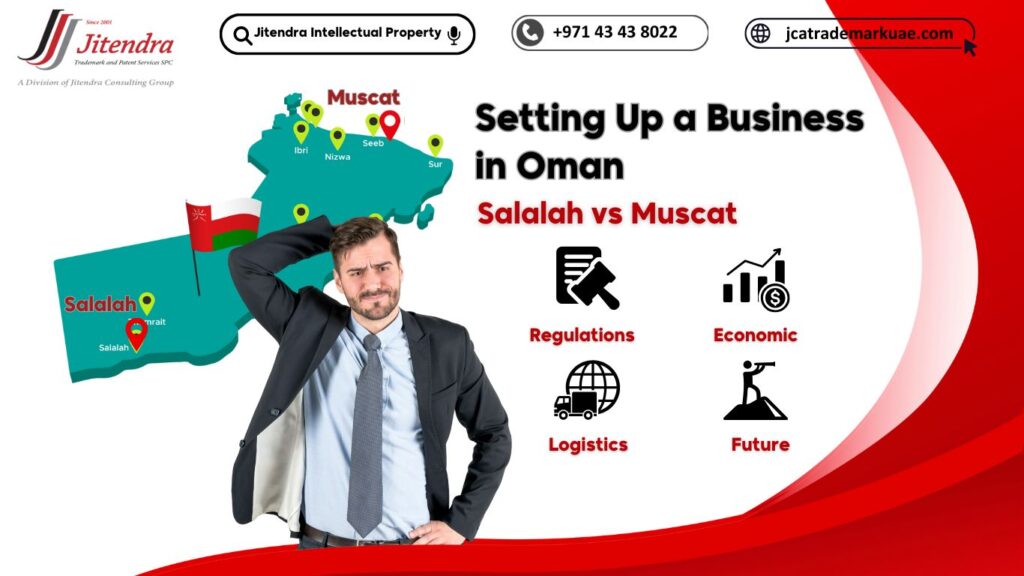Where to Start Your Business in Oman?
Are you confused about where to start your business in Oman—in Salalah or Muscat? Many investors, whether new or experienced, seek an ideal combination of lower costs, smooth paperwork, and good demand for their products or services. But the real challenge lies in balancing various factors: one city might offer better demand, while the other provides more attractive tax relief and incentives. This is particularly the challenge foreign investors face when choosing between Salalah and Muscat.
If you’re looking for expert help with business setup in Oman and wish to understand the ground reality before making your decision, this comprehensive guide is tailored for you. We will collectively explore the differences in costs, regulatory rules, market demand, and future outlook for both cities, and how business setup consultants in Oman can genuinely save you time and money throughout the entire process.
Understanding the Ground Reality: Muscat vs Salalah
Before delving into detailed comparisons, it’s important to understand that both Salalah and Muscat offer real business potential in the Sultanate of Oman. However, they cater to different needs and investor mindsets:
- Muscat: Provides established infrastructure, a ready and more mature market, and a traditional business environment.
- Salalah: Offers generous incentives, lower costs, and newer opportunities in specialized sectors.
Let’s explore the key differences that will help you make an informed decision regarding company formation in Salalah or company formation in Muscat.
1. Infrastructure Investment and Economic Sectors
Infrastructure is a crucial factor in choosing a business location, as it impacts operational costs, market access, and ease of doing business.
- Muscat: The Traditional Business Hub with Major Investment Muscat has seen over $2 billion invested in infrastructure over the past five years. This includes the development of modern business parks, advanced road networks, sophisticated logistics facilities, and luxury real estate. This development makes it more attractive for established and mature sectors such as finance, consulting, and luxury tourism.
- Salalah: The New Growth Hub for Technology and Trade Meanwhile, Salalah has seen approximately $1.2 billion in development. But the twist here is that this amount is directed towards vital and futuristic fields such as tech parks, AI chip manufacturing plants, and enhanced logistics. This means that if your business is in technology, international trade, or high-value-added industries, setting up a business in Salalah could give you a competitive edge with less competition in these emerging sectors.
Therefore, the decision is yours: do you prefer a polished and established market in Muscat or high-growth potential and new opportunities in Salalah?
2. Corporate Regulations in Oman and Ownership Percentages
Legal regulations and foreign ownership percentages are pivotal factors influencing investors’ decisions.
- Royal Decree 38/2025: Unified Rules for Special Economic Zones In April 2025, Oman rolled out Royal Decree No. 38/2025, which unified the rules for Special Economic Zones. This means that both Salalah and Muscat now follow simplified registration and licensing procedures within these zones, reducing bureaucratic complexities and facilitating company setup in Oman.
- Foreign Ownership and Tax Exemptions: Salalah’s Edge In Muscat, outside Free Zones and specific sectors, foreign investors can still only hold up to 70% ownership in companies. On the other hand, the Salalah Free Zone offers highly attractive investment incentives, including 100% foreign ownership, full customs duty exemptions, and fast-track visa processing. These advantages make the cost of company formation in Salalah more appealing for many businesses seeking maximum tax and operational efficiency.
Setting up a business in Oman through professional business setup consultants in Oman helps you avoid mistakes, especially when navigating such complex legal zones. Don’t let paperwork delay your dream.
If you’re still confused, utilize our business setup consultants in Oman to conduct a location audit based on your product or service type and determine if Oman’s Free Zones are suitable for you.
3. Connectivity, Travel, and Access: Logistics and Global Gateway
Logistics and ease of access are crucial factors for businesses relying on import and export, or frequent travel.
- Salalah Port: A Growing Logistics Hub In 2025, Flyadeal launched new routes to Salalah, a significant step towards improving air access. More importantly, Salalah Port is already outperforming Muscat’s port, thanks to its strategic location for cargo and re-exports to African and Asian markets. This translates into faster movement and lower shipping costs for businesses focused on logistics, manufacturing, and trade.
- Muscat International Airport: Oman’s Gateway to the World Muscat, meanwhile, still dominates in terms of international access with Muscat International Airport, one of the region’s most active airports. If your business involves constant travel or high-level international meetings, then setting up a business in Muscat might make more sense due to its extensive air connectivity.
4. Future Opportunities: What’s in the Pipeline?
The future visions for both cities are shaped to support different economic sectors, in line with Oman Vision 2040.
- Salalah: A Hub for Technology and Innovation Salalah is making big bets on future tech. In February 2025, the city signed an MoU to build an AI chip manufacturing unit. This is huge news, positioning Salalah as a potential advanced technology hub. Along with the new waterfront urban masterplan, this demonstrates Salalah’s openness to modern industries and untapped opportunities.
- Muscat: Consolidating its Position as a Business and Luxury Tourism Center Muscat continues to develop its premium and luxury segments. The St. Regis Al Mouj Muscat, for example, was voted the best business hotel in the Middle East this May. This kind of visibility attracts investors, top professionals, and tourists alike, bolstering the hospitality, services, and consulting sectors.
Both cities are on the move; you just need to match your vision and business objective to the right place. Use expert business setup consultants in Oman to guide you before signing that first document.
| Aspect | Muscat | Salalah |
|---|---|---|
| Market Maturity | Established, mature market | Emerging, growing sectors |
| Main Sectors | Finance, Consulting, Luxury Tourism | Technology, AI chip manufacturing, Trade, Logistics |
| Infrastructure Investment | Over $2 billion in past 5 years (business parks, roads, logistics, real estate) | ~$1.2 billion (tech parks, AI manufacturing, logistics) |
| Ownership Regulations | 70% foreign ownership outside Free Zones | 100% foreign ownership in Salalah Free Zone |
| Tax Incentives | Limited outside Free Zones | Full customs duty exemptions and tax incentives |
| Registration Procedures | Simplified under Royal Decree 38/2025 | Simplified under Royal Decree 38/2025 |
| Key Legal Advantage | Traditional business environment | Fast-track visa processing, more favorable Free Zone regulations |
| Connectivity (Air) | Muscat International Airport — strongest global connections | New Flyadeal routes improving air access |
| Connectivity (Sea) | Muscat Port — regional | Salalah Port — strategic global cargo and re-exports hub |
| Future Projects | St. Regis Al Mouj Muscat (luxury tourism) | AI chip manufacturing plant, waterfront urban masterplan |
| Ideal For | Businesses needing international access, high-level meetings, luxury sectors | Technology, trade, manufacturing, companies seeking lower costs and incentives |
Why Partner with Experts Like Jitendra Trademark and Patent Services (JTP)?
Considering handling your business setup in Oman yourself? You might, but you risk losing time, facing rejections, or worse, incurring penalties later due to non-compliance with regulations. This is where we step in.
Jitendra Trademark and Patent Services (JTP) has been guiding entrepreneurs and investors in company formation in Oman for years. We understand local laws, business culture, and complex regulatory pitfalls. From picking the right license that suits your activity to opening your bank account, we simplify every step.
If you’re planning business setup in Salalah or aiming for a stronghold in Muscat, our specialists offer the right advice, accurate documentation, and full support. We don’t offer generic templates; we provide customized guidance that ensures your compliance and success.
With our business setup consultants in Oman, you skip the hassle and start with clarity. No matter your budget, sector, or business stage, we’ll help you set up without stress.
Frequently Asked Questions (FAQ)
What is the cost of setting up a company in Salalah compared to Muscat?
The cost of company formation in Salalah is generally lower, especially in the Salalah Free Zone, which offers incentives and exemptions from customs duties and taxes, reducing initial and operational costs compared to some areas in Muscat.
Can foreigners own 100% of companies in Oman?
Yes, Omani law allows 100% foreign ownership in Free Zones like the Salalah Free Zone. In mainland Muscat, foreign ownership percentages might be limited (up to 70%) in certain sectors, unless an exception applies.
What is Royal Decree 38/2025 and its relation to Special Economic Zones?
Royal Decree 38/2025 is a new law that unified the rules for Special Economic Zones in Oman, aiming to simplify registration and licensing procedures within these zones (like Salalah Free Zone) to facilitate investment and attract more businesses.
Is Salalah Port better than Muscat Port for logistics businesses?
Salalah Port is a leading port in the region, known for its strategic location for shipping and re-exports, offering faster movement and lower shipping costs compared to Muscat Port. This makes it a preferred choice for logistics and manufacturing businesses.
How does Oman Vision 2040 contribute to supporting businesses in Salalah and Muscat?
Oman Vision 2040 aims to diversify the economy. Salalah focuses on technology, AI, and logistics to boost growth in these new sectors, while Muscat continues to develop its infrastructure for sectors like finance, tourism, and services. This creates supportive environments for businesses in both cities, but with different strategic focuses.




